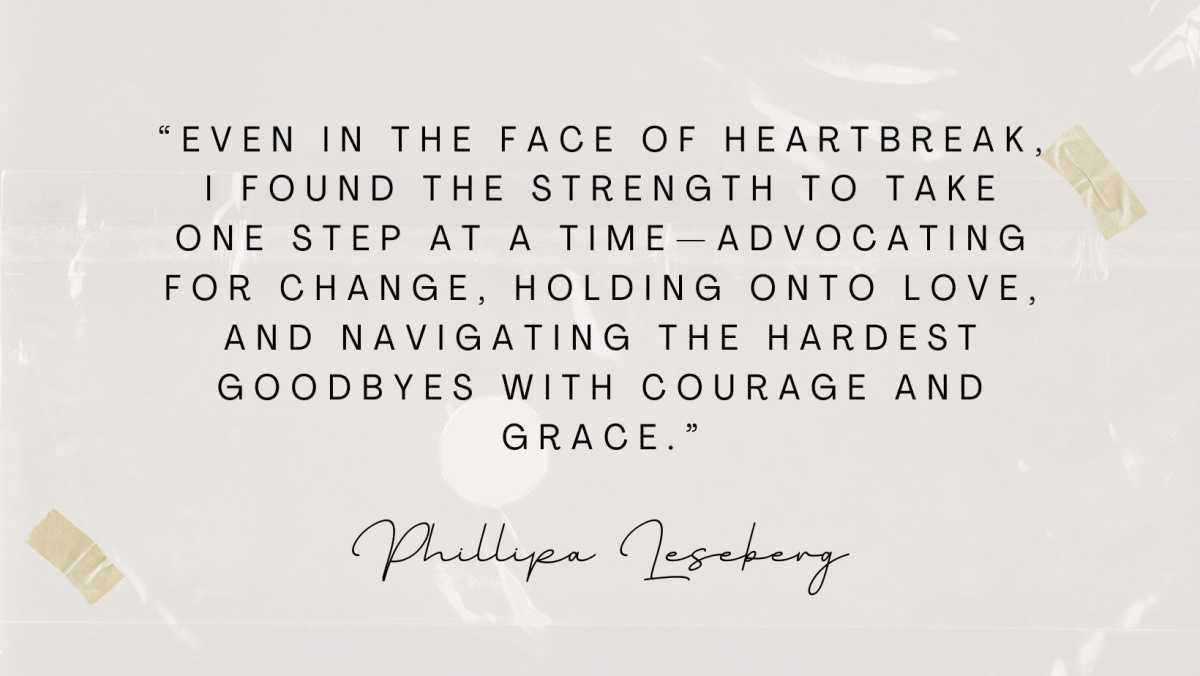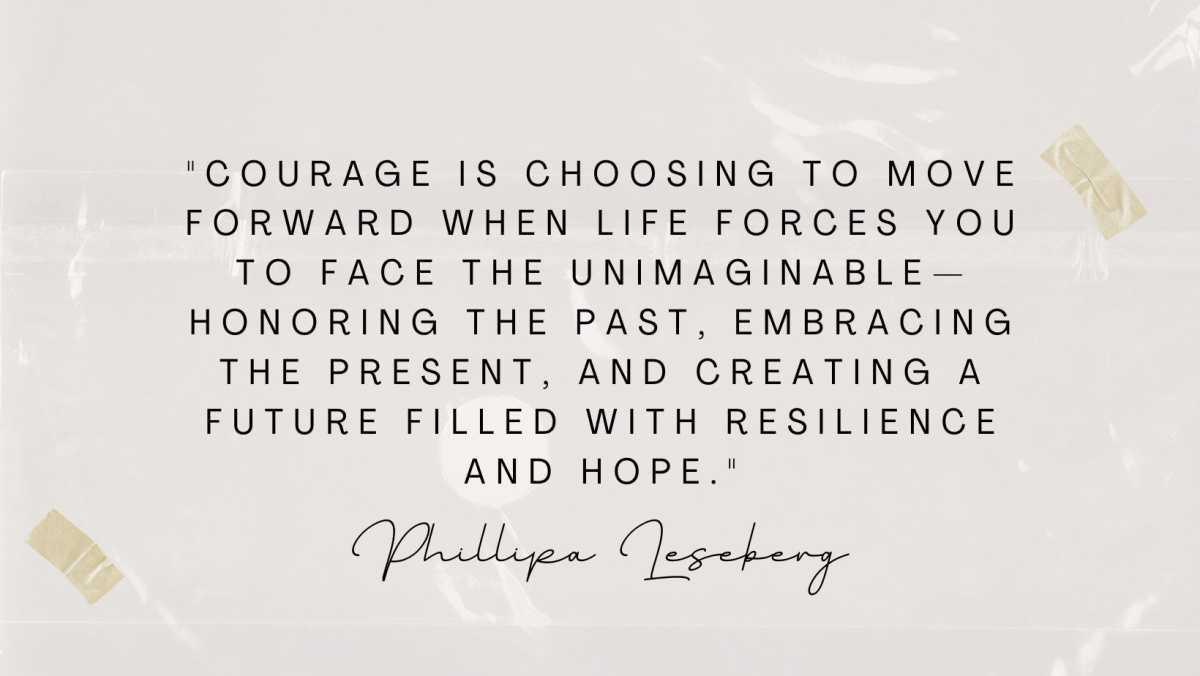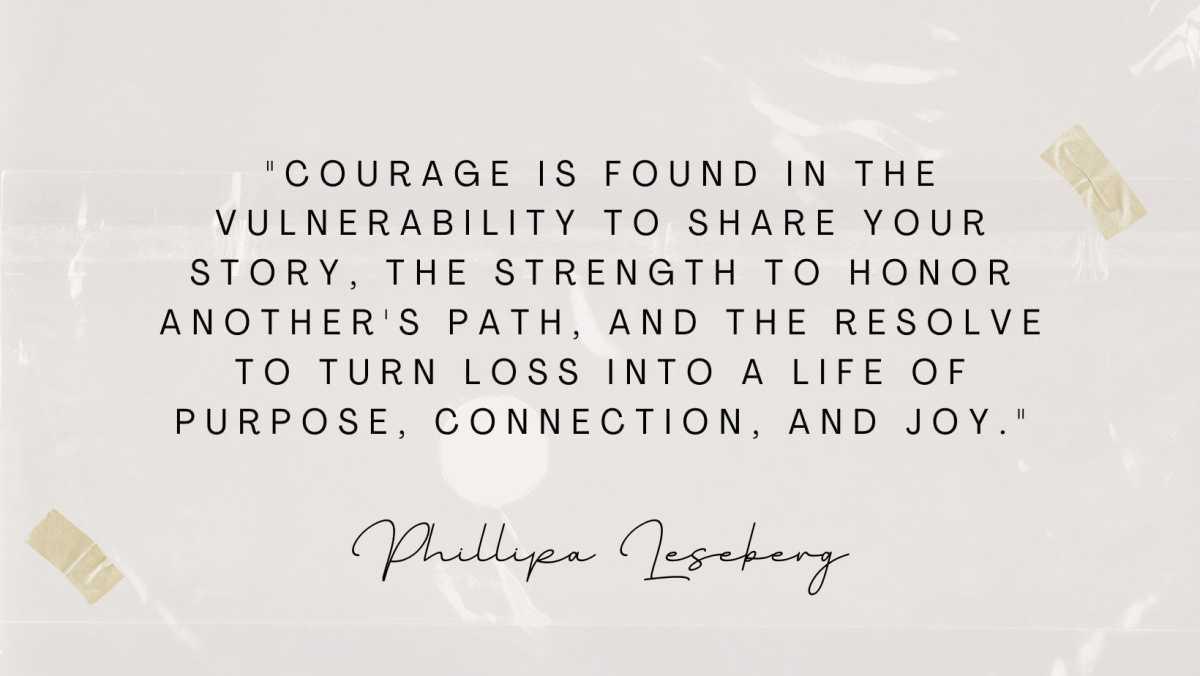1. Describe the moment when you knew you had to tap into your inner courage and make
changes in your life.
There were a couple of pivotal points. The first was when a niggle in my husband’s back turned into a cancer diagnosis. Everything changed from that moment, and I stepped up and into the role of his biggest cheerleader, supporter, transporter, appointment scheduler, researcher, shoulder to lean and cry on, hand-holder and gratitude giver.
The second occurred thirteen months later…the moment my husband decided he couldn’t fight the stage 4 Non-Hodgkins cancer fight for one more day. I knew I would be losing him in a matter of days, and that I would need to find a way for my teen daughter and I to continue without my beloved husband and her daddy.
2. Walk us through the pivotal moment when you decided to act courageously. What was going
through your mind? How did you feel at that moment?
For thirteen months, my husband had been fighting the battle with cancer…chemo, radiation, surgery, medications galore, and he’d been poked, prodded, and tested every which way. Eleven months of the fight took place in the US with the traditional cancer treatments we all know about. We also explored his options beyond borders and spent an extraordinary two months in Mexico, where it looked like alternative cancer treatments might work.
Finally, after coming back to the US, when the medical professionals told him he’d need dialysis for 12-13 hours a day, he couldn’t take it one more moment. He started pulling out his IV’s and the doctors and I leapt forward and stopped him before he damaged himself too much. He turned to me and said, “I’m so sorry Bebe, but I have to die now.” I was heartbroken. Until that moment, I had thought a miracle would appear to save the day and save his life. I realized, that until that moment, I truly didn’t believe I was going to lose him.
He kept apologizing, “I’m so sorry. I’m so sorry.” I was devastated but knew in my heart of hearts that this was going to be the end for him, and aside from making phone calls to his mother, aunt, his two daughters and closest of friends, I didn’t leave his side until his breathing slowed and then stopped altogether.
3. What inspired or motivated you to take the courageous step you did? What were a few of the
first steps you took? What major actions did you have to take?
Regarding his final few days, I knew I had to act – to tell his two daughters that they would be losing their dad in the next few days and call him mom and his aunt to give them an opportunity to say goodbye.
I had to figure out the logistics of what was about to happen…were they going to move him into a hospice, or could he stay right there in the intensive care unit? I was terrified, but had to keep going, one step at a time.
It turned out that I had an opportunity to speak to one of the big doctor bosses and his PA. As my husband lay dying in his bed across the hallway, I pulled them into a side room and gave them a taste of my thoughts. I told them they had to find a way to do better and that it wasn’t just them, it was the system…how could they stand by and not fight for more healing for their patients. They should fight to find a better way. Be more preventative in the first place, then once people are sick with cancer, talk to them about healthy diets and alternative, healthier, holistic treatments.
4. Paint a picture of what your life was like before you encountered the challenge that called for
you to summon your courage.
My husband Eric and I had been married eight years earlier in New Zealand, (my birth country), and were living the married dream with our teen daughter in Kirkland, WA. I was working at Microsoft and had branched out into part-time real estate. Eric had a fabulous job at Microsoft, (one that utilized his strategic brain), and started to plan trips to Panama and South Africa for work. I was planning on accompanying him. Everything was going according to plan. What could possibly go wrong?
After his cancer diagnosis, he fought hard for 13 months to try to stay. He had followed the traditional program in the US system for 9 months, when they gave up on him, telling him he only had 6 weeks to live. We hightailed it down to Mexico, to a clinic that treated the whole body through functional medicine, versus symptom-management. After two months of what was a fantastic experience for him at the Mexican clinic, he came back to the US for more chemo, surgery and radiation and ultimately passed another couple months later. He really didn’t want to die, but he just couldn't do it anymore.
5. Were there any doubts or fears you had to overcome before taking action? How did you
manage them?
I had been aware of healthy eating and living habits for over 20 years when my husband was diagnosed with his life-threatening health predicament. I was afraid he was going to jump all over the traditional treatment programs for cancer and knew that the conventional solutions were not only well known to be carcinogenic, but had intense side effects too, (often creating more health problems to deal with) destroyed the immune system in the process, AND were unsuccessful for a decent percentage of patients. I was deathly afraid my husband would choose the conventional route without taking a moment to explore other more natural options. It was a fork in the road – a momentous life and death decision. At the same time, I knew that although this was OUR journey, it was my husband’s body. I had to learn to swallow my fears and figured that as our options were laid in front of us, we would figure out a way to slay the
cancerous dragon.
6. What were some of the challenges or obstacles you faced during your journey to overcome
this particular challenge?
There were really two challenges for me/us. The first was reconciling my mind with his treatment
choices, and the second was learning to live and move forward without him.
The first took courage, as I had so many reservations for his survival chances if he followed the traditional treatment route. The statistics didn’t look good. If conventional programs were slaying it, it would have been a different story. As it turned out, he apologized profusely when the US doctors told him they’d come to the end of the road, and he only have had 6 weeks to live. He said he wished he had listened to me earlier.
The second was a situation I found myself in, and really didn’t have a choice. I could have crawled into a ball, and not moved forward, or I could gather all the courage I needed and just do it - make life happen as a widow and head of household.
At the time of writing, my husband passed almost eight years ago, and he would be proud to know that I have found a great life path without him…I developed a successful real estate business, supported my daughter through college and will be there to help launch her into life, and I wrote a book, “His Name is Eric” about our love story and journey beyond borders to try to save his life.
7. Tell us about a memorable anecdote or turning point in your courageous journey.
I was curled into a little ball, lying on his side of the bed, shortly after he had passed. I recalled all the bucket items on his list – all the missed opportunities, things he had never had a chance to do. He wanted to sail around the Pacific in a tall ship, relax on the beaches and explore the Seychelles, do a photo-safari in Africa…so many things. I was distraught, and found it hard to breath, and decided to go for a hike in the state park next to where I was living. I started off walking, noticing the strong rays of sun coming through the trees. I stopped and turned my face up towards the sun, and I felt his presence…very strongly. I started running and I felt him running along beside me. He was no longer sick and dying in the bed…he was all light and love and I felt his strong presence from the big wide beyond. He gave me strength and told me I was
going to be fine – more than fine. He said I was going to thrive and go on to lead a happy and healthy life! And he was right!
8. What role models or sources of support helped you stay strong and resilient?
I read books and listened to podcasts about women that had lost their partners, and about death and dying. I wrote and journaled to help me process about, (what I call) the “sur-reality” of both the cancer journey and putting the pieces together of life without my big love and partner.
9. How did this experience impact your life and your perception of courage?
In this situation it was deeply personal and multifaceted because it took courage to accept his medical choices, that were not my choices, to face difficult (and to my mind unnecessary) pain and suffering with resolve and bravery. There was also an element of moral courage, standing up for what I felt was right, even though it wasn’t the mainstream belief system.
Then it took courage to go through the phases of grief and go on to keep loving life and to thrive
without him.
10. What lessons or wisdom have you gained from this experience that you'd like to share with
others?
Have the courage to stand up for what you believe in, but also the courage to follow along with and support another path if your “person” makes different choices.
When you lose someone close to you, in my case, my husband and partner, I found strength I didn’t know I had.
11. What unexpected or positive outcomes emerged from your courageous actions?
- I’m stronger in my resolve to live a healthy and happy life.
- I wrote a book about our journey, “His Name is Eric” and it’s almost out. A couple naturopathic doctors and a few fellow authors have read an advance copy and have said the book has been life-changing.
- I grew a successful real estate business, far exceeding my expectations for myself.
- I met people on our journey that have become some of my closest friends…people that I otherwise wouldn’t have run into.
- I have financial stability to follow my hopes and dreams for adventure, international travel and to write more books!
12. How do you define courage, and how has your definition evolved through your own
experiences?
Being vulnerable and sharing my story was something that evolved for me. Up until the cancer journey and ultimate loss of my husband, I would say that I was more about putting on a brave face, and just getting on with life…making it happen. What I learned through the journey is that it takes in inordinate amount of courage to get vulnerable. The juice in life is really connecting with people from that place and sharing your stories.
An example of this, and fortunately for me, a couple girlfriends had already been through their cancer journeys, and I had observed they weren’t afraid to share their journey on social media. Like many, I had been fascinated to read their posts and follow their journey. As it turned out, it was my daily Facebook posts that not only help me process both the horrendous and joyful elements of the journey, but also garnered incredible support from what became our Facebook family. The comments, likes, hearts, and hugs were what kept us going on some days when we struggled to maintain a hopeful outlook.
13. Is there a particular message or advice you'd like to convey to other women who may be
facing similar challenges?
Find ways to be happy. I am still on some Facebook support groups and such, and I would say that the vast majority of women are feeling like their life is over, that they will never be able to move on and be happy again. I know that everyone’s grief process is different and multi-faceted, but I do believe our departed beloveds would not want us to yearn for them forever and live an unhappy life. I truly believe they would be rooting for us…to live the life of our dreams!
14. In retrospect, do you have any regrets or things you would have done differently?
Looking back, I wish I had been more successful in advocating for healthier supporting mechanisms along the journey – insisted on better food in the hospital, (or brought it in from home daily), and begged harder for high dose IV’s to build his immune system, rather than tear it down, as examples.
I would have encouraged my husband to follow alternative protocols, either from the beginning, or at least part way through the process, when we observed the medical professionals were operating from guesswork. For example, I would have taken my husband to the clinic in Mexico earlier. It’s quite possible that if we had gone earlier, he would still be around.
I don’t spend time dwelling on these regrets, but I do wonder, and of course I wrote the book, in part, to help others be better prepared should they find themselves in the same predicament.
15. How has this experience shaped your identity or sense of self?
It has made me so much stronger than I thought possible. I had to step up, and into the role of mother, father, cheerleader, counselor, coach and everything for my teen daughter, (now in her twenties and about to graduate from college). I am amazed at what I’ve achieved in my life on my own and without my person, my husband, my Bebe, my lover, and my biggest supporter (although I do believe he is cheering me on, in spirit form, from the big wide beyond).
I’m living the life of my dreams…a successful real estate business, an (almost) published book, “His Name is Eric”, (available for pre-order Nov 26 th and officially launched December 10 th ), and have been happy as a single, vital and healthy, now 60-year-old woman. I am only now truly ready and open to meeting a new life partner…and I’m super curious to see who shows up in future days, weeks, and years!
16. What would you say to someone who is hesitant or afraid to take a courageous step in their life.
You can do it! No matter what life throws your way, there is always ALWAYS a path forward.
You are stronger and more capable than you realize, and you are not a victim!
Understand that it’s a process. Feel into where you’re at right here/ right now and acknowledge it's okay to be fearful and scared of the unknown. Sometimes we don’t have a choice not to move forward, and by taking one baby step at a time, you can avoid staying frozen and in place.
Seek support: Lean on friends, family, or a support group. In my case, I grew what I called a “Facebook Family”, and many of these people I had never even met, but they were right there on our journey when it was the two of us, and again when it was up to me to move forward on my own.
Dream: Daydream about the life you want. This really helped with my confidence, and helped keep me on track when I started going on a downwards spiral. Whenever those negative thoughts crept in, I would shift from thinking the worst to daydreaming about what I truly wanted to manifest in my life.
Write your own movie: It’s your life and no one else’s! Your life is not necessarily what your family thinks it should be, it’s not what some of the less supportive people in your life think it should be. It’s all about what you want! Aim big! Reach for the stars!
Phillipa Leseberg is a Kiwi-American adventurer, dolphin & whale swimmer, advocate for juicing and organic food, and debut author. As her husband battled cancer, she began to journal daily, a practice that was both cathartic and purposeful. The words she penned during those moments of vulnerability became the foundation of her first book, His Name is Eric. Phillipa shares the deeply personal story of a grand love affair interrupted, inspiring readers to seek, question, and advocate for their own health. Based in Seattle, she lives a life filled with writing, real estate, travel and adventure, frequently visiting her daughter and beloved pup in Hawai’i.




